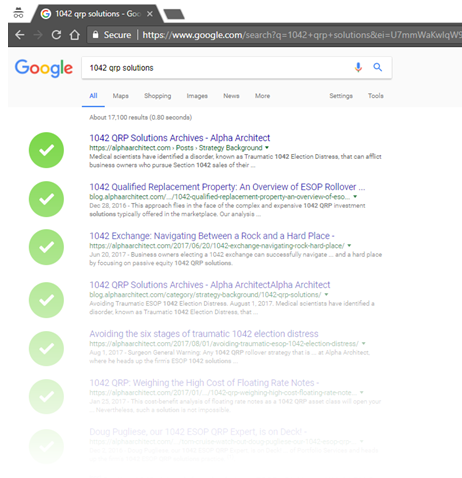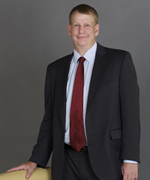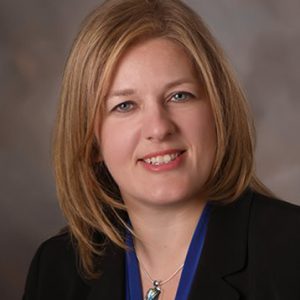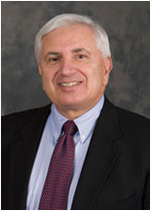Employee stock ownership plans (ESOPs) provide flexible and efficient mechanisms for addressing the succession and estate planning challenges of business owners, building employee engagement and creating real economic value in companies and communities. However, business owners who wish to explore the formation of an ESOP for their companies are immediately confronted with their first challenge: Finding expert and independent advice. This is particularly the case in the area of ESOP formations, because of the highly specialized legal expertise required to ensure tax and ERISA code compliance.
Hiring an ESOP attorney is, therefore, a logical first step.
Business owners should bear in mind that whichever expert you turn to first in your quest to decide if an ESOP is right for your company, it has been our experience that there will likely follow a cascading effect from that advisor’s selection – specifically, in terms of the appointment of the other transaction advisors – that will have important and potentially far-reaching consequences for the ESOP’s viability. Therefore, we urge you to read this article to gain an understanding of these implications before selecting your advisor.
This updated(1) article is intended to serve as a resource for business owners who are contemplating forming an ESOP at their companies.
- Section 1 outlines the basic challenge in locating an ESOP expert and proposes an approach to finding an ESOP attorney to assist you in evaluating whether an ESOP is appropriate for achieving your goals. It highlights the implications of the fiduciary standard of care for business owners who undertake ESOP transactions.
- Section 2 highlights an insidious challenge that can undermine the selection of an ESOP attorney and describes why it is important to anticipate this challenge even before embarking on preliminary discussions with outside experts. Most business owners are initially unaware of this issue, as it is largely unique to ESOP formations and to the sequential process by which ESOP advisory teams are engaged for such transactions.
- Section 3 describes our own encounter with the entrenched ESOP advisor referral relationships of the type described in this article and how we overcame them. It sets out the basis of our view that a lack of advisor independence is a real risk to business owners that they must consider at the outset of their deliberations. By “outset,” we mean right now.
- Section 4 represents our opinion as to who some of the true experts are in the ESOP legal community – the straight shooters who by all appearances to us act in their clients’ best interests and who guide them around unseen pitfalls that could otherwise evolve into precarious situations. They seem to us to have both subject-matter expertise, as well as independence. It is by no means an exhaustive list; rather it is a summary of those ESOP attorneys whom we’ve encountered to date and believe have the principled expertise and objectivity to safeguard their clients’ interests. If a business owner who is unfamiliar with the ESOP advisory landscape wished to abbreviate the rather lengthy due diligence process advocated below, he might reasonably consider these ESOP attorneys as proverbial “safe hands” with whom to start this journey.
Please bear in mind, our suggestions are no substitute for conducting your own advisor due diligence.
1. How to Hire an ESOP Attorney
Most business owners tend to turn to their circle of trusted advisors when seeking out an initial referral to an expert, such as to a specialized attorney. However this approach has several flaws, foremost of which is uncertainty as to whether one is being referred to an experienced ESOP attorney or merely to someone who has one-off transaction experience. This is because ESOP formations are relatively infrequent, compared to most other business transition strategies. It is a specialized niche, and the likelihood of finding expert advice through your local accountant or attorney is relatively low. That, unfortunately, does not stop many attorneys from holding themselves forth as experts; as the saying goes, with one deal under your belt there’s a story to tell and with two deals you have the expertise to sell. Such a cavalier attitude is perilous when considering an ESOP, for there is no adequate substitute for meaningful ESOP transaction experience among advisors – especially in an ESOP attorney.
A more reasoned approach to finding an expert would be to join one or both of the prominent industry associations that are focused on education and support of employee ownership issues: The National Center for Employee Ownership (NCEO) and The ESOP Association. These organizations have excellent professional directories(2), where service providers can pay to be listed. Bear in mind, however, that the NCEO and the ESOP Association take a neutral stance toward service providers and, as a policy matter, will not recommend one provider over another. To capitalize on the resources offered by the NCEO and ESOP Association and to safely avoid the pitfalls addressed further in this article, one should adopt a lengthier and more involved process to find an ESOP expert. Business owners should plan on attending the national conferences that each of these associations sponsors annually, in April and November, respectively. At these conferences, one can hear a wide range of ESOP attorneys speak on topics spanning the entire breadth of employee stock ownership plan issues – from ERISA, tax and regulatory matters, to deal structures, transaction financing and employee ownership culture. Attending a conference will likely get the business owner over the first hurdle of identifying the leading national experts who have ESOP-centric advisory practices.
In addition to the meaningful commitment of time, energy and resources that this approach requires, there remains a significant and yet insidious vulnerability to hiring your ESOP attorney in this manner. At the root of the problem lies what one federal judge recently called the “incestuous” nature of the ESOP advisory community. In a field marked by legal and regulatory scrutiny, cozy advisor relationships that potentially detract from advisor independence have been highlighted in the courts as a contributing factor to one or more recent, failed ESOP implementations. This is because every decision made along the entire implementation process – starting with the hiring of advisors – should be independent, conflict-free and hold up to the standard of fiduciary care. To the unsuspecting business owner who merely seeks to evaluate the merits and feasibility of an ESOP for his company, this creates an unforeseen challenge that lies behind the initial engagement of an ESOP attorney (or of any ESOP advisor, for that matter).
2. Why Hiring an ESOP Attorney Is Hard
It is a peculiar quirk of the ESOP industry – as with any highly regulated niche – that real expertise is concentrated in the legal professionals who devote a substantial amount (if not all) of their time to its practice. Beyond such focused practitioners, there are others calling themselves ESOP attorneys who have completed one or two ESOP transaction engagements and nonetheless hold themselves forth as experts. To our understanding, there is likely to be a gulf between these two groups’ capabilities, generally speaking. However, merely finding an expert ESOP attorney may not be enough to ensure the success of an otherwise viable ESOP formation. Business owners should carefully scrutinize any referrals proffered by their ESOP attorney toward the selection of remaining advisory team members. View these referrals as a starting point in your search efforts. Here’s why: More than in most professional corners, referrals among ESOP advisors can comprise a significant percentage of an ESOP advisor’s annual revenue. The same can be said not only of ESOP attorneys but also of valuation experts, financial advisors, trustees, and third-party administrators who operate in the ESOP space – and we have certainly observed it to be true of 1042 QRP providers with whom we compete. With comparatively few full-time practitioners relative to other fields, the range of referral sources in the ESOP community tends to be narrower. Over the years, such reciprocal referral relationships can become entrenched and highly lucrative.
Writing of this problem in a 2017 bench opinion for ESOP litigation surrounding the Constellis, Inc. ESOP, US District Judge Leonie Brinkema described how entrenched referral relationships can jeopardize an ESOP’s formation:
[The ESOP Trustee]’s lack of engagement and willingness to negotiate so favorably with the [seller’s financial advisor] may have been motivated by its significant business relationship with [that advisor], which refers more ESOP business to it than all other firms combined. Indeed the [trustee], [the seller’s financial advisor] and [the valuation consultant] were actually working on another ESOP transaction, for Martin Resources, at the same time they were negotiating the Constellis deal. These long term business relationships support the conclusion that the trustee had become complacent in relying on [the valuation firm]’s evaluation, and may have had an incentive to maintain its lucrative relationship with [the seller’s financial advisor].
This fact pattern led Judge Brinkema to make the following conclusion:
‘The ESOP world…[is] a very incestuous community[.]’ Although this reality may make it more difficult for a fiduciary to maintain its independence from its counterparts, it also makes that duty more important. The dangers of excessive familiarity are readily apparent.
Having come to this industry after serving many years as an investment banker(3), I found what was most interesting about this litigation – and about ESOPs more broadly – was the fact that the advisors described by Judge Brinkema represented opposing interests (counter-parties) in the ESOP’s formation. Perhaps uniquely to ESOPs, this is due to the sequential process by which ESOP advisory teams are assembled: Upon embarking on a transaction, the business owner is largely responsible for hiring his “counterparty,” the ESOP trustee, who then appoints a valuation expert of her own. The ESOP trustee must act in the best interests of the employees and, all else equal, seeks to negotiate ESOP purchase terms that are generally opposed to the economic interests of the business owner. It is reasonable to deduce from Judge Brinkema’s opinion that Constellis’ financial advisor had some level of influence over the selection of the ESOP trustee, who in turn appointed the valuation consultant. Such a daisy chain of advisor engagements would be difficult to imagine in a strategic M&A transaction between independent corporate counter-parties, where fiercely competitive economic and governance interests create inherent checks and balances. But ESOPs are a little different than M&A deals. The great good that they can create for their employees and their communities entails arguably a “gentler” formation process. The ESOP company does not undergo a convulsive change in ownership; instead, a butterfly emerges from the caterpillar’s silk cocoon. Without business owner vigilance at the outset, however, that metamorphosis can be jeopardized.
3. Our Perspective on this Challenge
For the record, we have met many fine ESOP attorneys during the past few years and believe most to be ethical, professional, competent and to act in their clients’ best interests. The biases inherent in the human condition affect us all, however, and it is human nature to develop professional working relationships with other competent advisors whom one respects and admires. The path toward entrenched advisor relationships, after all, begins with a mere rut. Our team at Alpha Architect wanted to share our thoughts on this challenge, because, as fiduciary investment advisors with an “outsider’s” perspective, we feel business owners need to be made aware of the potential pitfalls this article describes. We have experienced them ourselves and have observed how client interests can be undermined by that entrenchment.
Like stage actors viewing a theater performance from the wings before playing our own parts, we have come to observe that there is a lot more going on behind the scenes of the typical ESOP’s formation than meets the business owner’s eye. It is a delicate engagement to educate clients who are new to the ESOP structure, without initially overwhelming them with its complexity. Nonetheless, we have observed through our own client interactions that business owners need to be made aware of the potential for advisor biases and how these can conflict with their own interests at later stages of the transaction. The best ESOP attorneys have the experience and wisdom to guide clients successfully through such journeys.
Our firm is Alpha Architect, a well-regarded asset management firm and a relative new-comer to the ESOP community. (You can read recent articles profiling our firm in the New York Times, Wall Street Journal and Barron’s.) We manage five publicly-traded exchange-traded index funds and service several hundred managed accounts based on our intellectual property. Our own experience in the ESOP industry can be an instructive example of the sort of challenge this article describes. We developed an investment rollover solution for business owners seeking to defer their capital gains taxes through section 1042 exchanges. Our 1042 QRP investment strategy seeks to perform like the large-cap US equity index (you can read about our simple and affordable alternative to floating rate notes here and here). It is relevant to this article that we spent the past year knocking on the doors of the industry’s leading ESOP attorneys in an effort to educate them about our new approach.
Most ESOP attorneys to whom we described our innovation during this past year were open-minded and enthusiastic about our approach, however, plenty were not. A handful of ESOP attorneys candidly suggested that to gain acceptance, we would have to overcome longstanding relationships that many had built with investment managers who focused predominantly on floating rate notes. For our part, we fully expected to encounter a modicum of intransigence due to existing referral relationships. After all, the incumbent 1042 rollover strategy we are disrupting has been the default among advisors for over 30 years. It soon became apparent, however, that business owners for whom our solution could be more suitable were not benefitting from their advisors’ full objectivity, perhaps due to the conflicted “incentive to maintain…lucrative relationships” described by Judge Brinkema.
We designed our business model at Alpha Architect to overcome this hurdle by entirely bypassing entrenched referral relationships. To date, all of our 1042 QRP clients have told us that they first encountered us by reading about our §1042 rollover strategies on the internet, like you are doing now. By way of example, our published materials on the topic are prominent in Google’s search rankings(4):

Source: Google
We consequently feel empowered to educate business owners about this underlying advisory challenge in the ESOP world. After all, we don’t have any third party referral relationships that are jeopardized by this viewpoint. (Our silent partner, Google, does not appear to mind, either.)
Getting back to the problem of advisor independence, it is not in our nature to point out a challenge without also highlighting a potential solution. In the next section, we offer our own observations of the leading, client-driven ESOP attorneys that we have encountered during the past year – and why we hold them in high regard. Our recommendations below might not be for everyone; if you would prefer to attend a few conferences and develop your own opinions, we strongly encourage you to do so. However, if you are looking for an objective starting place where you might be reasonably confident in your footing, then you might find the next section of our article to be helpful.
4. How to Hire an ESOP Attorney — A Third Approach
We have completed a number of successful client transactions in which we have experienced, first-hand, a wide range of advisors operating across the entire breadth of our clients’ ESOP implementations. As fiduciaries ourselves, we think we can recognize principled and objective advisors when we see (and hear) them. We make a point of asking our own clients how they would rate their other advisory team members, and we always seek introductions to those they hold in high regard. As ESOP industry participants ourselves, we support Employee Ownership and attend about a dozen ESOP conferences per year. We actively seek to acquaint ourselves with prominent ESOP speakers at all such industry events.
From our perch in the ESOP industry, we offer our own observations and recommendations. We are beholden to the ESOP attorneys named below not because they have referred new clients to us, but because they have generously shared their expertise and insights with us in industry forums and during professional interactions. We believe they are true subject-matter experts and provide their clients the highest caliber of principled, objective and insightful advice. We also observe that they have developed long-term client relationships, which are challenging to maintain when clients are anything other than successful in their ESOP transactions. Our key criteria for their selection include our perceptions that they have a high degree of expertise, as demonstrated to us through speaking engagements and other thought leadership forums; Authoritative ESOP industry leadership, as acknowledged by their peers and demonstrated through professional longevity; and a general reputation among clients and other advisors for integrity and conflict-free advice. Here, in no particular order, are our favorites:(5)
James Steiker / President & CEO, SES ESOP StrategiesPhiladelphia, PA – Bio and Contacts

Edward Renenger / COO, SES ESOP StrategiesReading, PA – Bio and Contacts

Tabitha Croscut / Shareholder, Devine MillimetManchester, NH – Bio and Contacts

Rich Glassman / Partner, ESOP PlusWest Hartford, CT – Bio and Contacts

Richard Mapp III / Partner, Kaufman CanolesNorfolk, VA – Bio and Contacts

Other ESOP Attorneys
We have formed favorable impressions of ESOP attorneys who practice at a number of other, larger firms. These include Howard Levine (Drinker Biddle Reath – Chicago); John Kober and Brian Hector (Morgan Lewis – Dallas and Chicago, respectively); and David Pardys and David Surbeck (Holland & Knight – Philadelphia). For business owners with the resources or the need to hire an attorney from a global platform firm, we have been impressed by them. Please be advised that we do not believe the quality of the ESOP-specific legal advice one receives from these larger firms to be necessarily superior to that of the attorneys mentioned in more detail, above. However, we recognize that certain business owners may already have trusted relationships at these firms and therefore find comfort in keeping their transaction with an in-house ESOP attorney.
Conclusions
This article sets forth our team’s reflections on the challenges faced by business owners who seek to evaluate the merits of an ESOP in achieving their goals. What is unique here is that the problem highlighted by this article can emerge early in the evaluation process – much earlier than in other business transition strategies. We believe this is due to the serial process by which ESOP advisory team members are engaged, which we described in Section 2. This can catch business owners by surprise before they become aware of the issue. We have focused our discussion on ESOP attorneys because they are a logical first step for business owners who seek to wrap their arms around the complexities posed by this special type of exit strategy. But we could have said the same thing about corporate financial advisors, valuation consultants, and feasibility analysts, too. The listing of ESOP attorneys we offer in Section 4 is by no means exhaustive. We apologize in advance for omitting the mention of other deserving parties from our roster (we’re sure we have). Our goal in sharing our impressions is not to be conclusive in identifying the high-quality ESOP attorneys in the US. Rather we seek to offer business owners a potential alternative to the time-consuming and involved process of hiring an ESOP attorney that we advocate and have outlined in the early sections of this article. That more involved effort is worthwhile for the sound footing it offers business owners – in particular for avoiding the pitfalls of “incestuous” referral relationships. Nevertheless, we recognize it is not for all business owners, especially those with neither the time nor resources it requires. For those who might wish to shorten that diligence process, we offer in Section 4 some of our favorite ESOP attorney recommendations. We do so in the spirit of Good Samaritans, but caution that there is no substitute for conducting your own due diligence.
If after reading this article you’d like to have a deeper conversation, please reach out to us (ask for Doug). We are always happy to help out any way we can and are happy to share our knowledge of ESOPs and why they are such wonderful value-creation tools. If you are a business owner who has formed your own favorable impressions of an ESOP attorney with whom you have worked, we would also appreciate hearing from you and certainly welcome any introductions to the professionals whom you hold in high regard. The world is made a much better place by the successful development of an employee ownership culture, and we want to do our part to advance the cause.
References[+]
| ↑1 | Updated February 6, 2019 |
|---|---|
| ↑2 | See the following directory links: https://www.nceo.org/pages/directory.php and http://www.esopassociation.org/network/esop-experts. |
| ↑3 | You can find my bio here. |
| ↑4 | Source: Google search accessed on August 29, 2017 at: www.google.com/search?q=1042+qrp+solutions |
| ↑5 | Bear in mind that there is no substitute for conducting your own due diligence. |
| ↑6 | SES Advisors and Steiker, Greenapple & Fusco p.c. |
About the Author: Doug Pugliese
—
Important Disclosures
For informational and educational purposes only and should not be construed as specific investment, accounting, legal, or tax advice. Certain information is deemed to be reliable, but its accuracy and completeness cannot be guaranteed. Third party information may become outdated or otherwise superseded without notice. Neither the Securities and Exchange Commission (SEC) nor any other federal or state agency has approved, determined the accuracy, or confirmed the adequacy of this article.
The views and opinions expressed herein are those of the author and do not necessarily reflect the views of Alpha Architect, its affiliates or its employees. Our full disclosures are available here. Definitions of common statistics used in our analysis are available here (towards the bottom).
Join thousands of other readers and subscribe to our blog.

